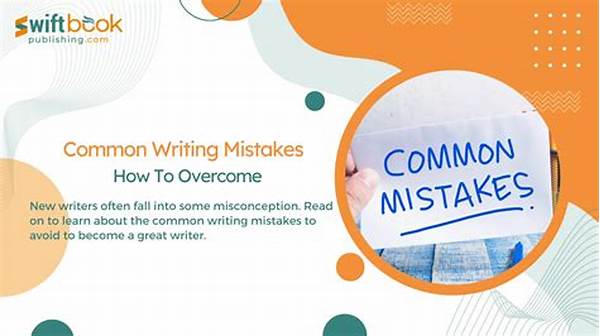Embarking on the journey of writing can feel like stepping into a world teeming with creativity and potential, yet fraught with pitfalls and challenges. Even the most well-intentioned scribes can stumble during the initial phases. Recognizing the common mistakes new writers often make can help ease this transition, refining their craft as they grow.
Overcomplicating Language
One of the most frequent mistakes new writers often make is overcomplicating their language. Novel writers often believe that utilizing complex vocabulary will bolster their work’s sophistication. Instead, it can obscure their message, making the text cumbersome to read. At the heart of effective writing is clarity; the aim is to communicate, not confuse. A writer’s “voice” is most authentic when it’s straightforward, allowing the narrative to breathe and the ideas to flow seamlessly. Recognizing this common pitfall encourages writers to strike a balance between eloquence and accessibility.
Readers appreciate writing that speaks directly to them without needing a dictionary at every turn. Simple language, when used creatively, can be profoundly engaging. It allows stories to shine and reach a broader audience, highlighting the power of well-chosen words presented cleanly. New writers often gain confidence in their storytelling by focusing on clarity first, discovering that simplicity can enhance character development, plot progression, and thematic expression.
Neglecting Character Development
Another mistake new writers often make is neglecting character development. Characters are the heart of any story, yet they can sometimes become afterthoughts in the rush to develop a compelling plot. Giving characters depth and multidimensionality, with flaws and strengths, makes a story more relatable and engaging. When characters are well-developed, they drive the plot forward in ways that feel organic and inevitable.
Novice writers may not always spend enough time fleshing out their characters’ backgrounds, motivations, and emotional arcs, impacting reader empathy. By diving deep into the characters’ psyche, new writers can create a bond between their creations and readers, maintaining interest throughout the narrative. They would do well to listen to their characters more closely, letting them evolve naturally through the pages to avoid this common misstep.
Ignoring Structure and Pacing
Structure and pacing are often underestimated by new writers, yet they are crucial to a story’s success. Mistakes new writers often make include ignoring how a story unfolds over time and how much breathing space characters and plots need. These aspects can dictate whether the audience remains captivated or drifts away.
Novice writers may introduce too many elements too quickly, or, conversely, linger too long in stagnant waters. A well-paced story maintains momentum without feeling rushed, allowing moments of tension and release to ebb and flow naturally. Writers can greatly benefit from revisiting their outlines, ensuring the narrative has a defined arc that guides the reader toward a satisfying conclusion.
Lack of Editing and Revision
One of the most serious mistakes new writers often make is overlooking the editing and revision process. The first draft is a rough gem, capturing raw creativity. However, the true artistry lies in the revision stages where writers refine their work, cutting unnecessary elements and enhancing strengths. A polished piece requires several rounds of edits, each focusing on different aspects—from grammar and syntax to narrative cohesion and voice consistency.
By neglecting this critical phase, writers may publish something that doesn’t reflect their true potential. Mistakes new writers often make include rushing this process, eager to see their work in print. However, patience in revision fortifies confidence and pride in their final product. Taking feedback on board and being open to rewrites can transform an ordinary manuscript into a compelling masterpiece.
Fear of Taking Risks
Finally, mistakes new writers often make encompass a reluctance to take risks. Fear of criticism or failure can lead to playing it safe, crafting stories that fall in line with established norms instead of pushing boundaries. Innovation and originality are birthed from courage—the courage to explore new ideas, experiment with style, and tackle unconventional topics. By stepping outside of their comfort zones, writers can discover unique voices and perspectives that distinguish their work.
It’s understandable for new writers to hesitate, but embracing creativity and risk-taking can lead to unexpected breakthroughs. These choices invite curiosity and conversation among readers, setting the writer apart in a saturated market. Mistakes become learning opportunities, and with each daring step, new writers bloom into seasoned authors with distinctive tales to tell.
Fostering a Supportive Writing Community
Engaging with a supportive writing community can mitigate many mistakes new writers often make. By sharing experiences, receiving constructive feedback, and learning from the journeys of others, writers cultivate an environment of growth and encouragement. Writing can be solitary, but finding a group of like-minded individuals provides motivation and accountability.
Through participation in critique groups and writing workshops, new writers receive invaluable insights into their work. Such engagement promotes personal and professional development, reinforcing the understanding that writing is an evolving craft. Mistakes are not immutable; they are stepping stones to forming a robust writing identity.
Summary
In exploring the mistakes new writers often make, we uncover pathways to becoming adept storytellers. Mistakes don’t signify failure; they are integral to growth. By recognizing and addressing common pitfalls—overcomplicating language, neglecting character depth, ignoring structure, omitting revision, and fearing risks—writers transform their prose. Each mistake is an opportunity to learn and refine one’s craft, turning initial endeavors into seasoned triumphs.
A supportive community plays a crucial role, where shared knowledge and experiences bolster a writer’s journey. By embracing these aspects, new writers illuminate their paths with promising potential, equipped to craft narratives that resonate and endure. With patience and perseverance, these initial hurdles become cherished milestones in an ever-evolving artistic pursuit.
